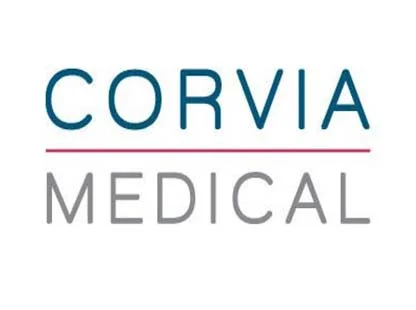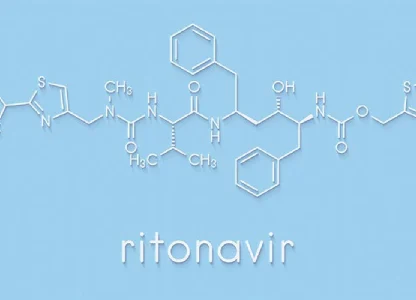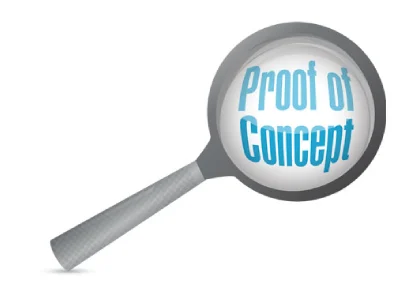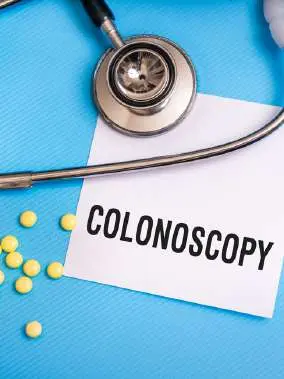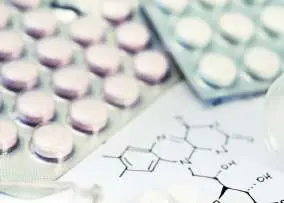Drug and Medical Device Development: A Strategic Approach - Online Program
What does it take to bring a new medical device or pharmaceutical to life?
Digital disruption in healthcare has opened the market for new products that are data-driven and patient-centered. But bringing a medical device or drug to market is very different from building other kinds of products. Added layers of regulation make it a highly complex process.
Who Should Attend?
The MIT xPRO Drug and Medical Device Development: A Strategic Approach program is designed for individuals and companies that operate in the health product industry as well as those looking to enter this fast-growing industry. Having a background in health sciences is helpful, but not required. The program is ideal for:
Engineers involved in the development of new medical device products or pharmaceuticals
Executives in the drug and medical device development/product management field
Scientists and those who lead teams of scientists in R&D
Quality assurance and regulatory affairs professionals
Professionals making a horizontal transition into the healthcare industry
Entrepreneurs seeking to launch a product in the U.S. healthcare market
Companies in need of training employees and new hires on the entire process of developing medical devices and pharmaceuticals
Key Takeaways
Gain a “big picture” perspective of the entire drug and medical device development process, from day one strategic planning through product commercialization.
Understand the critical interplay between strategy and development—and how they affect each other.
Learn frameworks for assessing both the benefits and the risks associated with developing a new product in the healthcare market.
Gain clarity around the regulatory requirements in the U.S. market and the process for achieving approval.
Develop professional networks for career development, industry partnerships, or strategic alliances.
“This program explodes the notion that there is ‘research’ followed by ‘development’. These forces are intertwined until you launch it.”
- Professor Michael Cima, Program Director and MIT Associate Dean of Innovation
Program Modules
Over the course of seven modules, you will learn how to anticipate and address the complexities involved with developing medical products. Designed to provide a big picture view of initiating a medical drug or product development, this program explains the whole process one concept at a time.
Note: For full details on the program modules, please download the brochure.
Industry Leaders
You will learn from industry experts from a wide variety of backgrounds, including leaders in healthcare, pharmaceuticals, venture capital, insurance, intellectual property law, and regulatory agencies. Featured experts include:

Senior Managing Partner, CEO, Flagship Ventures

PhD, Research Manager, Surgical Innovations at Medtronic

PhD, President and Chief Executive Officer, Microchips Biotech

CEO, Editas

VP, Immunology Scientific Innovation at Johnson & Johnson

PhD, Consultant, Formerly the VP of Global Pharmacology Development, Merck

PhD, JD Partner, Clark+Elbing

Partner, Goodwin Proctor

PhD, Director of the Motion Analysis Laboratory, Spaulding Rehabilitation Hospital

ScD, CSO, Kala Pharmaceuticals

Executive VP & CTO, Microchips Biotech

Chief Scientific Officer, Taris Biomedical

CEO, Analgesic Solutions

PhD, Clinical and Technical Operations, Arsanis

PhD, MD, Duke University

MD, President and Chief Executive Officer, Voyager Therapeutics

PharmD, BCPS Chief Development Officer, Arsanis

President, Intertech Engineering

Director, Center for Drug Evaluation and Research, FDA

Partner, 3rd Rock Ventures

CEO, Alnylam

CEO, T2 Biosystem

CEO, Alkermes

CEO, Taris Biomedical

VP, Head of Worldwide Medicinal Chemistry Pfizer (Now SVP, Medicinal Science & Technology, GlaxoSmithKline)
Program Highlights
Webinars
Over 40 Interviews with Industry Experts
Real-world Application
Byte-Sized Learning
Earn a certificate and 4 Continuing Education Units (CEUs) from MIT xPRO
Peer Learning & Feedback
Mobile Learning App
Grading & Evaluation
MIT Faculty

David H. Koch Professor of Engineering
Michael is the David H. Koch Professor of Engineering and a Professor of Materials Science and Engineering at the Massachusetts Institute of Technology at the David H. Koch In...
Guest Faculty
Chief Executive Officer, 46brooklyn Research
Parker B. Francis Distinguished Professor of Medicine, Harvard Medical School
Patent Attorney, Blueshift IP, LLC
Cardiologist, Massachusetts General Hospital
Chief Science Office (ret), Exact Science
Note: *Guest Faculty are subject to change.
Testimonials
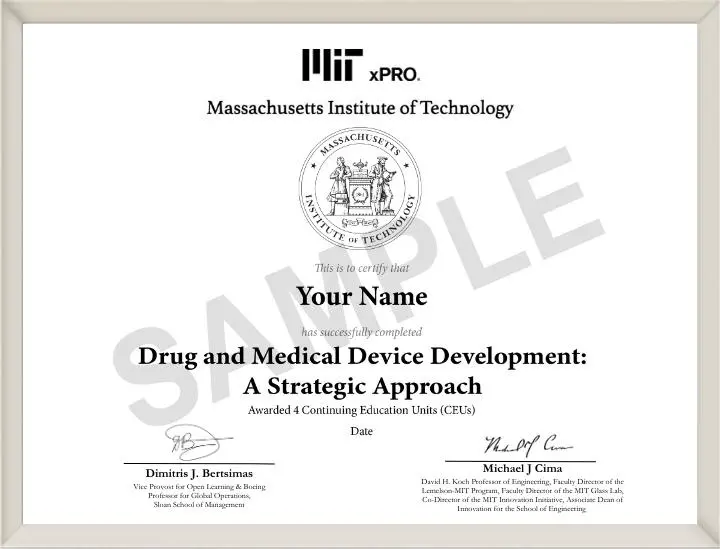
Certificate
Get recognized! Upon successful completion of this program, MIT xPRO grants a certificate of completion to participants and 4 Continuing Education Units (CEUs). This program is graded as a pass or fail; participants must receive 75% to pass and obtain the certificate of completion.
After successful completion of the program, your verified digital certificate will be emailed to you, at no additional cost, in the name you used when registering for the program. All certificate images are for illustrative purposes only and may be subject to change at the discretion of MIT.
FAQs
Financing Options
Climb Credit*
We offer financing options with our partner, Climb Credit*. Click here to learn more.
*Applicable for US Residents
Flexible Payment Options For All
Flexible payment options allow you to pay the program fee in installments. Click here to see payment schedule.
Didn't find what you were looking for? Write to us at learner.success@emeritus.org or Schedule a call with one of our Program Advisors or call us at +1 401 443 9591 (US) / + 44 189 236 2347 (UK) / +65 3129 7174 (SG)
Early Registrations Are Encouraged. Seats Fill Up Quickly!
Flexible payment options available.
Starts On


